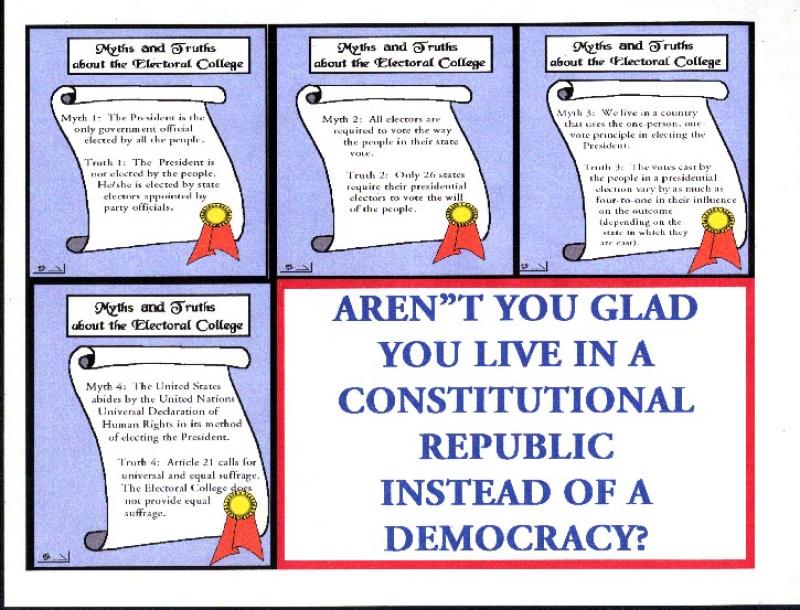The Electoral College doesn't benefit small states. What it does is even dumber.



In discussions about abolishing the Electoral College, supporters return time and time again to the plight of small states like Wyoming or Mississippi. "Ditch the Electoral College, and Small States Will Suffer," reads the title of an article by Tara Ross.
The Electoral College does give disproportionate mathematical weight to small states. But its goofy structure means almost all of them are ignored in presidential politics. If the president was elected by simple majority vote, almost all small states would get more attention than they currently do.
We can examine this quantitatively. The organization FairVote compiled all the election campaign events in 2016, while the National Popular Vote movement (the one Ross is complaining about above) summarized it in handy form . The 2016 candidates spent almost all their time in a handful of states, most of them medium or large. Two-thirds of campaign events happened in just six states — Florida, North Carolina, Pennsylvania, Ohio, Virginia, and Michigan. If we include Iowa, New Hampshire, Colorado, Nevada, Wisconsin, and Arizona, then those 12 states account for 96 percent of campaign events.
The nine smallest states (including D.C.), meanwhile, got precisely zero attention. Only the tenth-largest, New Hampshire, got any events at all. In total, 25 states (mostly small and medium-sized) got no events whatsoever. And while it's true the states that got huge attention are mostly on the big side, the very largest states were almost totally ignored as well — California and Texas got one event apiece, and New York none.
The reason for this is obvious. Almost every state gives all of its electoral votes to whoever wins the state — allowing candidates to take the votes of strongly partisan states for granted. Indeed, it's actively foolish to campaign where you are guaranteed to win or lose — only the swing states matter. It would be a waste of resources for a Democrat to campaign in California or Kentucky, or for a Republican to campaign in New York or D.C.
Let's imagine how things might play out under a national popular vote alternative. When all votes matter, candidates will spread out their attention to states roughly according to their share of the population (not perfectly of course, given travel time and such, but surely pretty close). We can simply divide up the 399 events by each state's share of the national population.
By this estimate, the smallest five states — Wyoming, D.C., Vermont, North Dakota, and Alaska — would have gotten one event apiece in 2016. In reality, they got none. Meanwhile, medium-sized states like Oklahoma, Oregon, and Kentucky would have gotten five, five, and six events respectively. In reality, they got none. New York, Texas, and California would have gotten 25, 33, and 48. In reality, as we have seen, only the latter two got even one event.
It is simply beyond question that the Electoral College does not lead presidential candidates to cater to the interests of small states, or big states. On the contrary, only states that randomly happen to have a close partisan balance get attention. It's just a profoundly stupid way to select who gets to hold the most powerful office in the world.
Small state partisans might complain that one event is still not very many for a whole state, when California might get 48. But why should small states get disproportionate weight over national politics (especially given that they already have it in the Senate)? State authorities also rightly maintain power over the many concerns that have been left by the Constitution to that level of government — stuff like most crime and education policy, for example. It is fine for the Wyoming government to decide how they want to run those policy topics in Wyoming itself, but simply unfair to give them a disproportionate say over how the entire country is run.
Others complain that candidates might spend most of their time in cities, ignoring rural voters. Again, this is already true of the current system — candidates don't campaign at all in most rural states and tend to prefer cities even when they do. But at bottom, rural voters will get the same say as everyone else, commensurate with their roughly 20 percent share of the population. In a democracy, votes should count equally.
It's not hard to discern what is going on here. Conservatives currently perceive that the Electoral College provides them with a partisan advantage, and so they are reverse-engineering arguments to support it. They typically boil down to this sort of maudlin appeal to an idyllic image of family farms and small towns. But they just don't hold up under any scrutiny.


If it’s so dumb, it should be easy to repeal.
Good luck with that.
So much for understanding what the article was saying.
The solution is simple, make an Amendment with 2 parts:
1) All states must use Congressional Districts for the Electoral votes representing US Representatives for the state and 2 winner-take-all votes.
2) All Congressional districts must be drawn as square as possible.
That ends 2 things:
1) All districts will be equally represented in the Electoral College so cities no longer get all the attention when events are held in a state, since no state is winner-takes-all.
2) Gerrymandering goes goodbye for the most part. That means more people represented based on where they live rather than on which party their area votes for normally in a district.
Gosh Tom I tend to agree with you.